MGNT803: Critical Analysis of Organizational Culture and Leadership
VerifiedAdded on 2022/10/18
|8
|2219
|300
Report
AI Summary
This report provides a critical analysis of organizational culture and leadership, drawing from various academic sources. It explores how leadership styles, particularly transformational leadership, influence organizational culture and employee performance. The report examines the impact of organizational culture on employee commitment, motivation, and overall business effectiveness. It compares different perspectives on organizational culture, leadership, and their impact on the workplace, highlighting the importance of aligning leadership strategies with organizational culture for achieving competitive advantages. The report also offers recommendations for managers to foster a healthy organizational culture through effective leadership, employee motivation, and long-term planning. The analysis emphasizes the close relationship between organizational culture, employee behavior, and business outcomes. This study also emphasizes the importance of understanding the culture's impact on employee satisfaction and productivity and how it directly influences the success or failure of an organization.
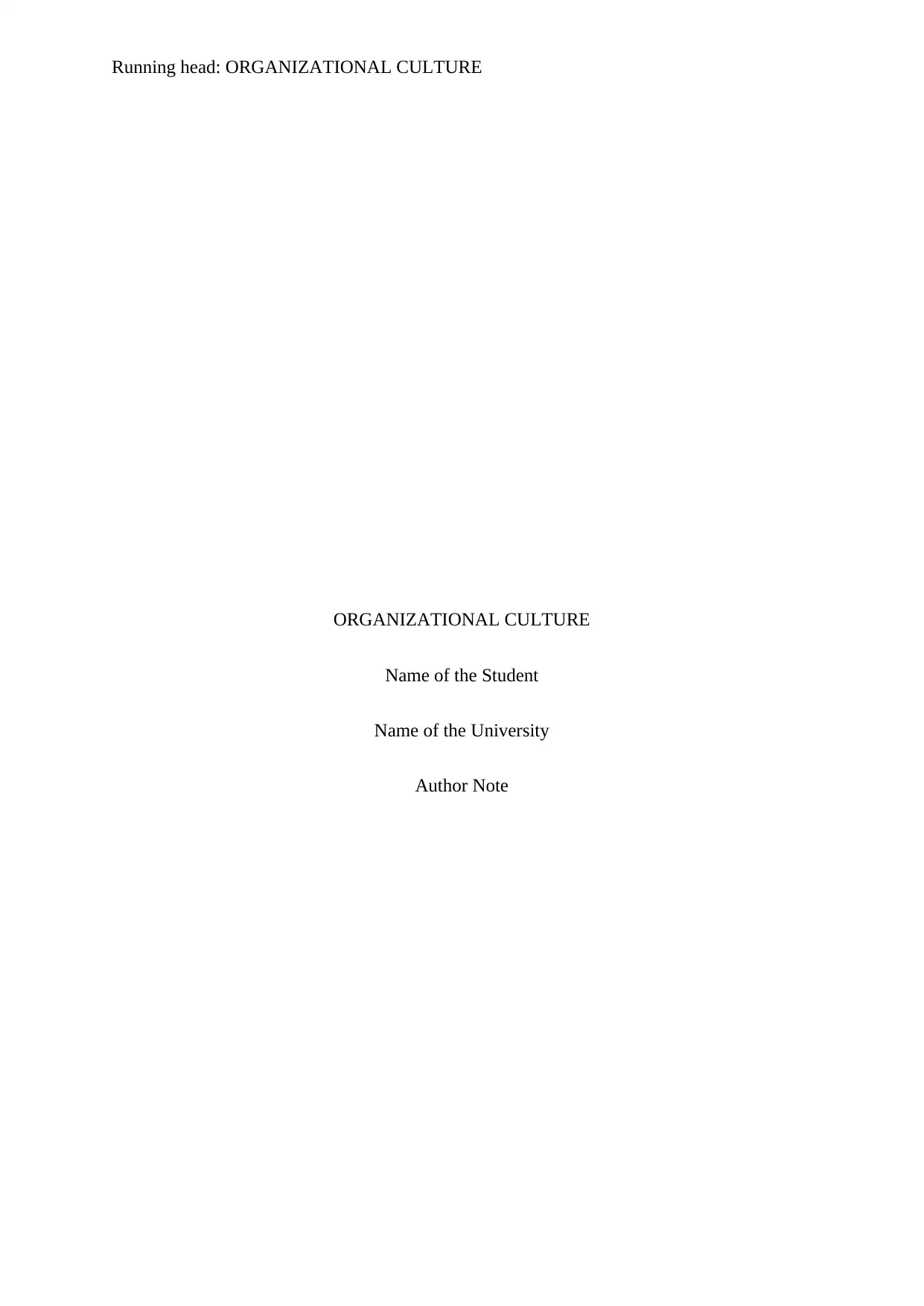
Running head: ORGANIZATIONAL CULTURE
ORGANIZATIONAL CULTURE
Name of the Student
Name of the University
Author Note
ORGANIZATIONAL CULTURE
Name of the Student
Name of the University
Author Note
Paraphrase This Document
Need a fresh take? Get an instant paraphrase of this document with our AI Paraphraser
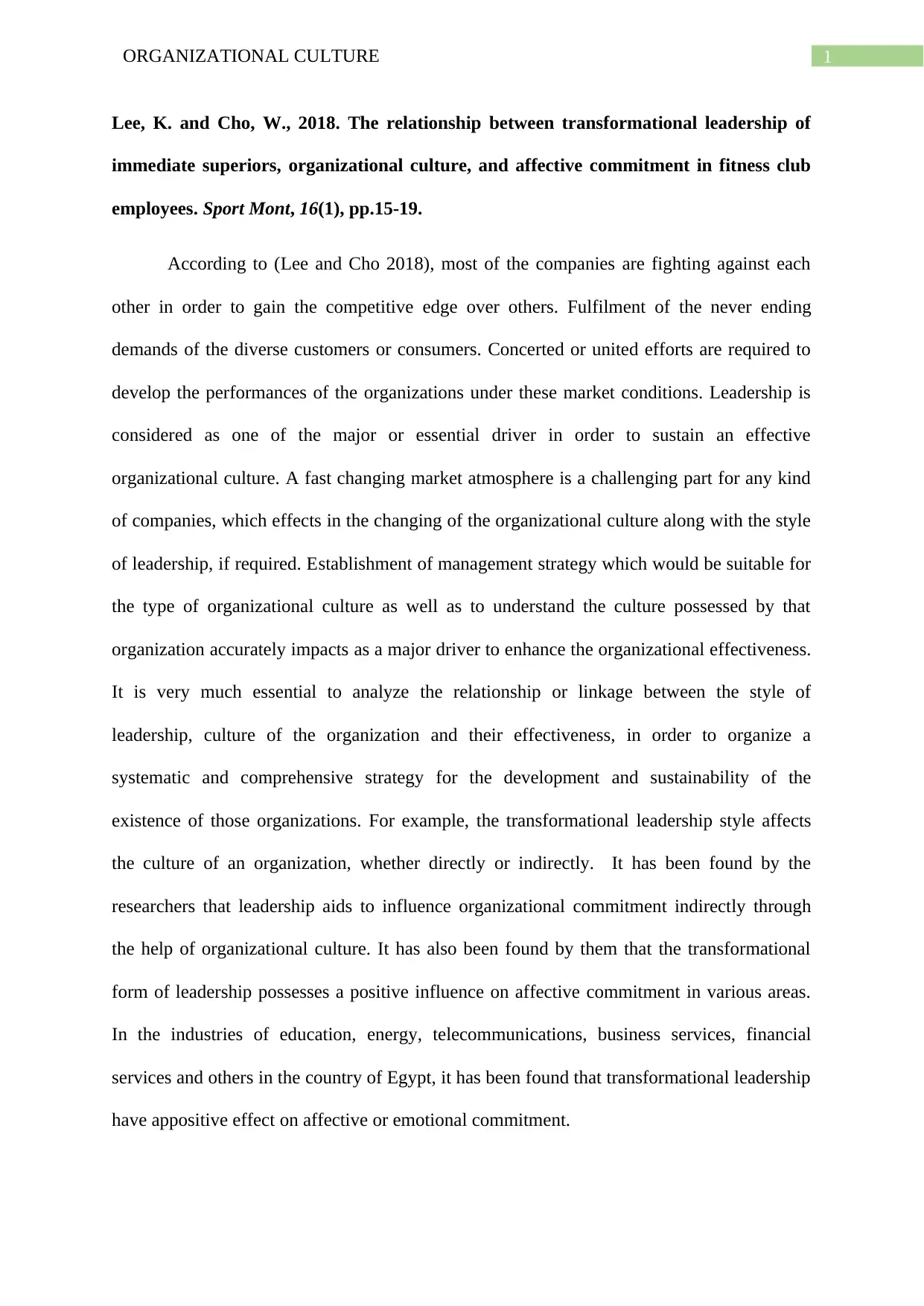
1ORGANIZATIONAL CULTURE
Lee, K. and Cho, W., 2018. The relationship between transformational leadership of
immediate superiors, organizational culture, and affective commitment in fitness club
employees. Sport Mont, 16(1), pp.15-19.
According to (Lee and Cho 2018), most of the companies are fighting against each
other in order to gain the competitive edge over others. Fulfilment of the never ending
demands of the diverse customers or consumers. Concerted or united efforts are required to
develop the performances of the organizations under these market conditions. Leadership is
considered as one of the major or essential driver in order to sustain an effective
organizational culture. A fast changing market atmosphere is a challenging part for any kind
of companies, which effects in the changing of the organizational culture along with the style
of leadership, if required. Establishment of management strategy which would be suitable for
the type of organizational culture as well as to understand the culture possessed by that
organization accurately impacts as a major driver to enhance the organizational effectiveness.
It is very much essential to analyze the relationship or linkage between the style of
leadership, culture of the organization and their effectiveness, in order to organize a
systematic and comprehensive strategy for the development and sustainability of the
existence of those organizations. For example, the transformational leadership style affects
the culture of an organization, whether directly or indirectly. It has been found by the
researchers that leadership aids to influence organizational commitment indirectly through
the help of organizational culture. It has also been found by them that the transformational
form of leadership possesses a positive influence on affective commitment in various areas.
In the industries of education, energy, telecommunications, business services, financial
services and others in the country of Egypt, it has been found that transformational leadership
have appositive effect on affective or emotional commitment.
Lee, K. and Cho, W., 2018. The relationship between transformational leadership of
immediate superiors, organizational culture, and affective commitment in fitness club
employees. Sport Mont, 16(1), pp.15-19.
According to (Lee and Cho 2018), most of the companies are fighting against each
other in order to gain the competitive edge over others. Fulfilment of the never ending
demands of the diverse customers or consumers. Concerted or united efforts are required to
develop the performances of the organizations under these market conditions. Leadership is
considered as one of the major or essential driver in order to sustain an effective
organizational culture. A fast changing market atmosphere is a challenging part for any kind
of companies, which effects in the changing of the organizational culture along with the style
of leadership, if required. Establishment of management strategy which would be suitable for
the type of organizational culture as well as to understand the culture possessed by that
organization accurately impacts as a major driver to enhance the organizational effectiveness.
It is very much essential to analyze the relationship or linkage between the style of
leadership, culture of the organization and their effectiveness, in order to organize a
systematic and comprehensive strategy for the development and sustainability of the
existence of those organizations. For example, the transformational leadership style affects
the culture of an organization, whether directly or indirectly. It has been found by the
researchers that leadership aids to influence organizational commitment indirectly through
the help of organizational culture. It has also been found by them that the transformational
form of leadership possesses a positive influence on affective commitment in various areas.
In the industries of education, energy, telecommunications, business services, financial
services and others in the country of Egypt, it has been found that transformational leadership
have appositive effect on affective or emotional commitment.
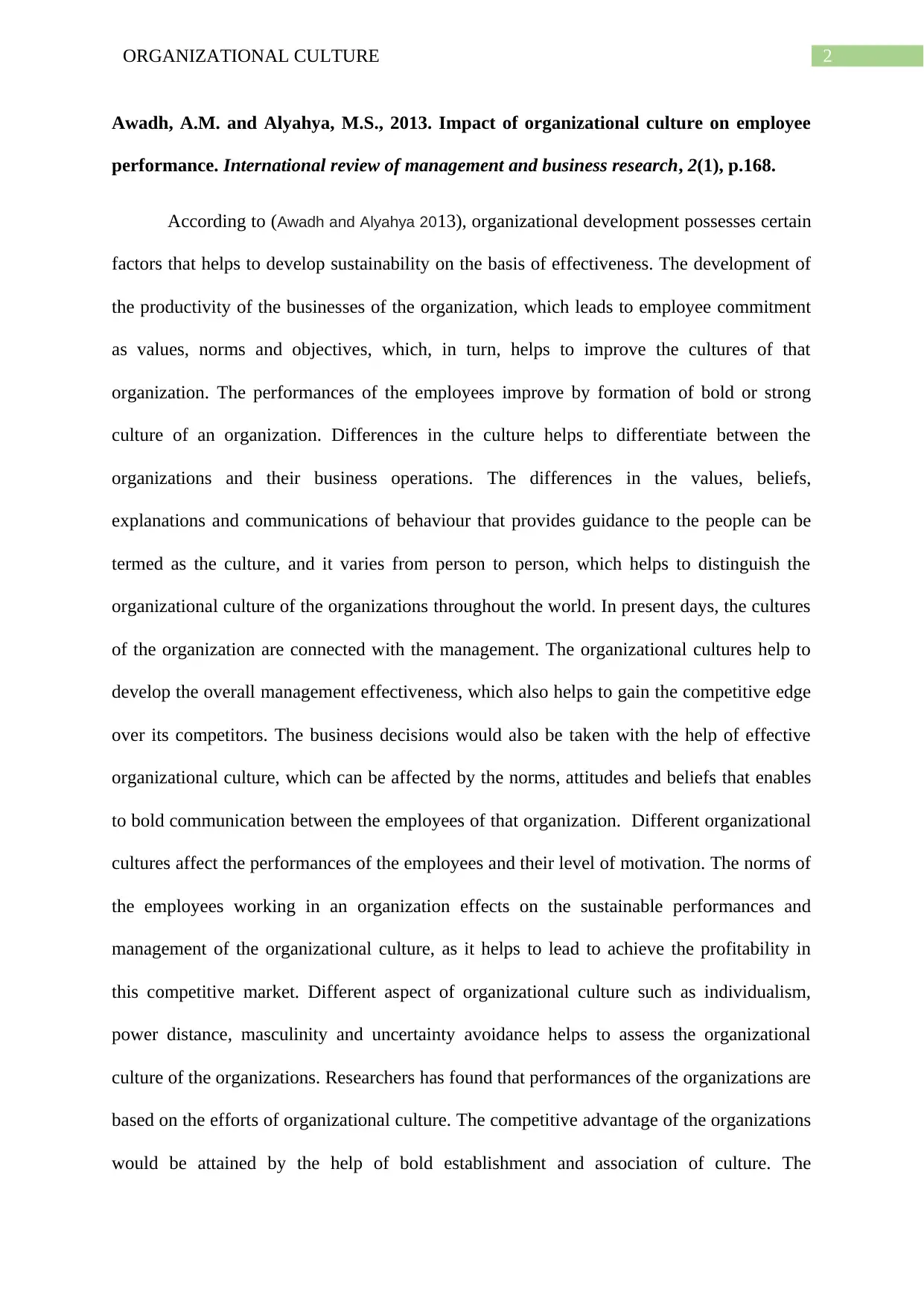
2ORGANIZATIONAL CULTURE
Awadh, A.M. and Alyahya, M.S., 2013. Impact of organizational culture on employee
performance. International review of management and business research, 2(1), p.168.
According to (Awadh and Alyahya 2013), organizational development possesses certain
factors that helps to develop sustainability on the basis of effectiveness. The development of
the productivity of the businesses of the organization, which leads to employee commitment
as values, norms and objectives, which, in turn, helps to improve the cultures of that
organization. The performances of the employees improve by formation of bold or strong
culture of an organization. Differences in the culture helps to differentiate between the
organizations and their business operations. The differences in the values, beliefs,
explanations and communications of behaviour that provides guidance to the people can be
termed as the culture, and it varies from person to person, which helps to distinguish the
organizational culture of the organizations throughout the world. In present days, the cultures
of the organization are connected with the management. The organizational cultures help to
develop the overall management effectiveness, which also helps to gain the competitive edge
over its competitors. The business decisions would also be taken with the help of effective
organizational culture, which can be affected by the norms, attitudes and beliefs that enables
to bold communication between the employees of that organization. Different organizational
cultures affect the performances of the employees and their level of motivation. The norms of
the employees working in an organization effects on the sustainable performances and
management of the organizational culture, as it helps to lead to achieve the profitability in
this competitive market. Different aspect of organizational culture such as individualism,
power distance, masculinity and uncertainty avoidance helps to assess the organizational
culture of the organizations. Researchers has found that performances of the organizations are
based on the efforts of organizational culture. The competitive advantage of the organizations
would be attained by the help of bold establishment and association of culture. The
Awadh, A.M. and Alyahya, M.S., 2013. Impact of organizational culture on employee
performance. International review of management and business research, 2(1), p.168.
According to (Awadh and Alyahya 2013), organizational development possesses certain
factors that helps to develop sustainability on the basis of effectiveness. The development of
the productivity of the businesses of the organization, which leads to employee commitment
as values, norms and objectives, which, in turn, helps to improve the cultures of that
organization. The performances of the employees improve by formation of bold or strong
culture of an organization. Differences in the culture helps to differentiate between the
organizations and their business operations. The differences in the values, beliefs,
explanations and communications of behaviour that provides guidance to the people can be
termed as the culture, and it varies from person to person, which helps to distinguish the
organizational culture of the organizations throughout the world. In present days, the cultures
of the organization are connected with the management. The organizational cultures help to
develop the overall management effectiveness, which also helps to gain the competitive edge
over its competitors. The business decisions would also be taken with the help of effective
organizational culture, which can be affected by the norms, attitudes and beliefs that enables
to bold communication between the employees of that organization. Different organizational
cultures affect the performances of the employees and their level of motivation. The norms of
the employees working in an organization effects on the sustainable performances and
management of the organizational culture, as it helps to lead to achieve the profitability in
this competitive market. Different aspect of organizational culture such as individualism,
power distance, masculinity and uncertainty avoidance helps to assess the organizational
culture of the organizations. Researchers has found that performances of the organizations are
based on the efforts of organizational culture. The competitive advantage of the organizations
would be attained by the help of bold establishment and association of culture. The
⊘ This is a preview!⊘
Do you want full access?
Subscribe today to unlock all pages.

Trusted by 1+ million students worldwide
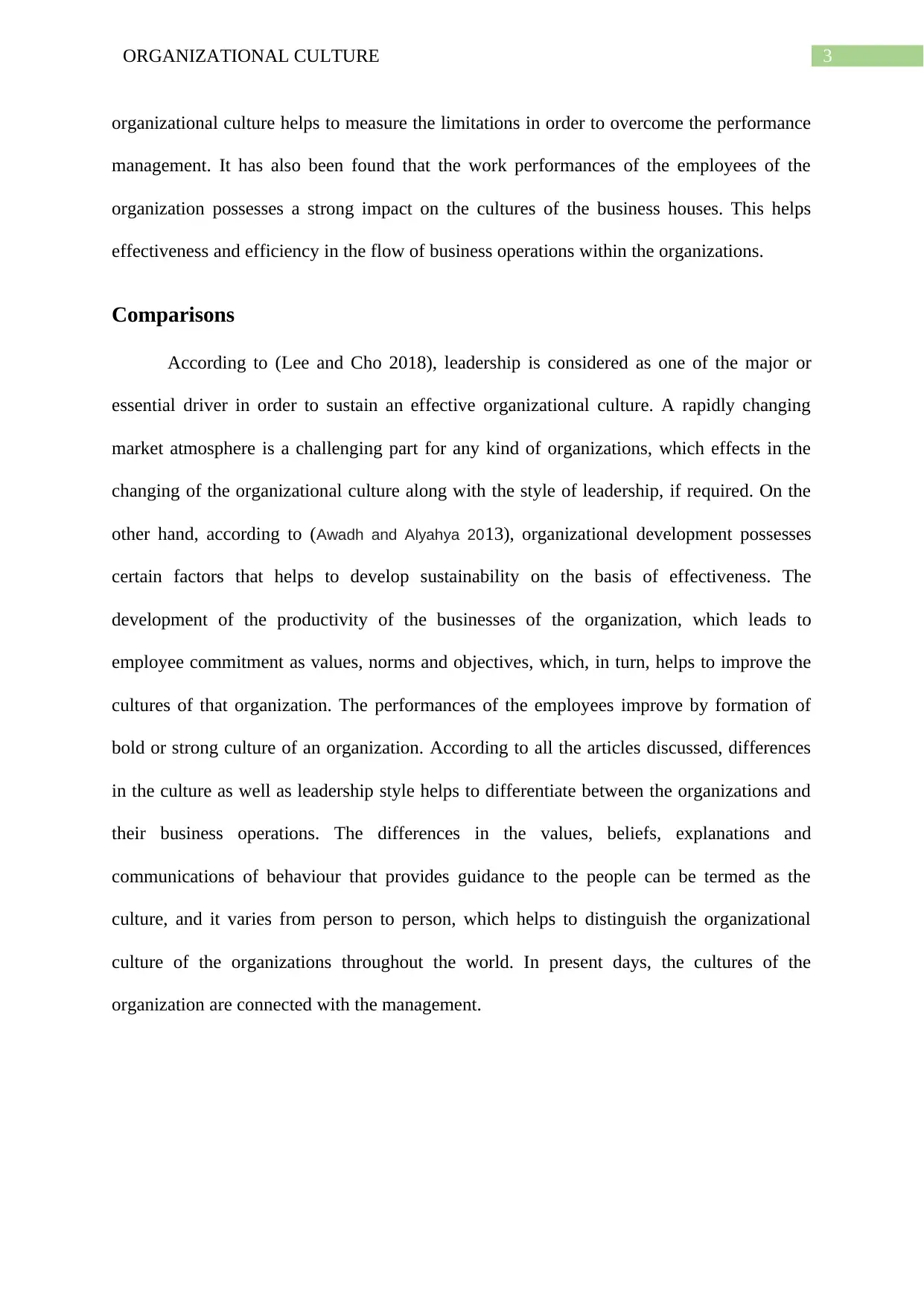
3ORGANIZATIONAL CULTURE
organizational culture helps to measure the limitations in order to overcome the performance
management. It has also been found that the work performances of the employees of the
organization possesses a strong impact on the cultures of the business houses. This helps
effectiveness and efficiency in the flow of business operations within the organizations.
Comparisons
According to (Lee and Cho 2018), leadership is considered as one of the major or
essential driver in order to sustain an effective organizational culture. A rapidly changing
market atmosphere is a challenging part for any kind of organizations, which effects in the
changing of the organizational culture along with the style of leadership, if required. On the
other hand, according to (Awadh and Alyahya 2013), organizational development possesses
certain factors that helps to develop sustainability on the basis of effectiveness. The
development of the productivity of the businesses of the organization, which leads to
employee commitment as values, norms and objectives, which, in turn, helps to improve the
cultures of that organization. The performances of the employees improve by formation of
bold or strong culture of an organization. According to all the articles discussed, differences
in the culture as well as leadership style helps to differentiate between the organizations and
their business operations. The differences in the values, beliefs, explanations and
communications of behaviour that provides guidance to the people can be termed as the
culture, and it varies from person to person, which helps to distinguish the organizational
culture of the organizations throughout the world. In present days, the cultures of the
organization are connected with the management.
organizational culture helps to measure the limitations in order to overcome the performance
management. It has also been found that the work performances of the employees of the
organization possesses a strong impact on the cultures of the business houses. This helps
effectiveness and efficiency in the flow of business operations within the organizations.
Comparisons
According to (Lee and Cho 2018), leadership is considered as one of the major or
essential driver in order to sustain an effective organizational culture. A rapidly changing
market atmosphere is a challenging part for any kind of organizations, which effects in the
changing of the organizational culture along with the style of leadership, if required. On the
other hand, according to (Awadh and Alyahya 2013), organizational development possesses
certain factors that helps to develop sustainability on the basis of effectiveness. The
development of the productivity of the businesses of the organization, which leads to
employee commitment as values, norms and objectives, which, in turn, helps to improve the
cultures of that organization. The performances of the employees improve by formation of
bold or strong culture of an organization. According to all the articles discussed, differences
in the culture as well as leadership style helps to differentiate between the organizations and
their business operations. The differences in the values, beliefs, explanations and
communications of behaviour that provides guidance to the people can be termed as the
culture, and it varies from person to person, which helps to distinguish the organizational
culture of the organizations throughout the world. In present days, the cultures of the
organization are connected with the management.
Paraphrase This Document
Need a fresh take? Get an instant paraphrase of this document with our AI Paraphraser
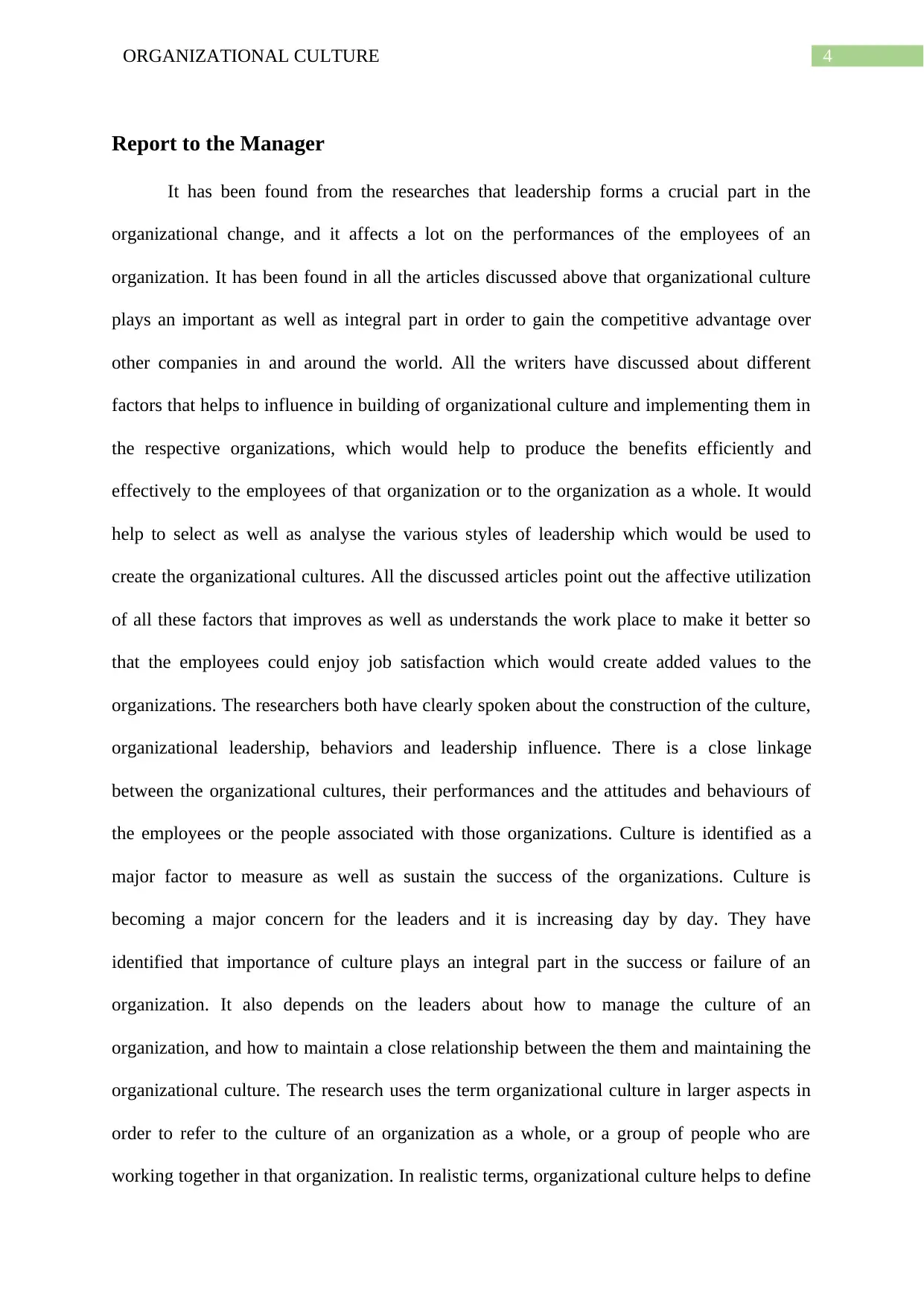
4ORGANIZATIONAL CULTURE
Report to the Manager
It has been found from the researches that leadership forms a crucial part in the
organizational change, and it affects a lot on the performances of the employees of an
organization. It has been found in all the articles discussed above that organizational culture
plays an important as well as integral part in order to gain the competitive advantage over
other companies in and around the world. All the writers have discussed about different
factors that helps to influence in building of organizational culture and implementing them in
the respective organizations, which would help to produce the benefits efficiently and
effectively to the employees of that organization or to the organization as a whole. It would
help to select as well as analyse the various styles of leadership which would be used to
create the organizational cultures. All the discussed articles point out the affective utilization
of all these factors that improves as well as understands the work place to make it better so
that the employees could enjoy job satisfaction which would create added values to the
organizations. The researchers both have clearly spoken about the construction of the culture,
organizational leadership, behaviors and leadership influence. There is a close linkage
between the organizational cultures, their performances and the attitudes and behaviours of
the employees or the people associated with those organizations. Culture is identified as a
major factor to measure as well as sustain the success of the organizations. Culture is
becoming a major concern for the leaders and it is increasing day by day. They have
identified that importance of culture plays an integral part in the success or failure of an
organization. It also depends on the leaders about how to manage the culture of an
organization, and how to maintain a close relationship between the them and maintaining the
organizational culture. The research uses the term organizational culture in larger aspects in
order to refer to the culture of an organization as a whole, or a group of people who are
working together in that organization. In realistic terms, organizational culture helps to define
Report to the Manager
It has been found from the researches that leadership forms a crucial part in the
organizational change, and it affects a lot on the performances of the employees of an
organization. It has been found in all the articles discussed above that organizational culture
plays an important as well as integral part in order to gain the competitive advantage over
other companies in and around the world. All the writers have discussed about different
factors that helps to influence in building of organizational culture and implementing them in
the respective organizations, which would help to produce the benefits efficiently and
effectively to the employees of that organization or to the organization as a whole. It would
help to select as well as analyse the various styles of leadership which would be used to
create the organizational cultures. All the discussed articles point out the affective utilization
of all these factors that improves as well as understands the work place to make it better so
that the employees could enjoy job satisfaction which would create added values to the
organizations. The researchers both have clearly spoken about the construction of the culture,
organizational leadership, behaviors and leadership influence. There is a close linkage
between the organizational cultures, their performances and the attitudes and behaviours of
the employees or the people associated with those organizations. Culture is identified as a
major factor to measure as well as sustain the success of the organizations. Culture is
becoming a major concern for the leaders and it is increasing day by day. They have
identified that importance of culture plays an integral part in the success or failure of an
organization. It also depends on the leaders about how to manage the culture of an
organization, and how to maintain a close relationship between the them and maintaining the
organizational culture. The research uses the term organizational culture in larger aspects in
order to refer to the culture of an organization as a whole, or a group of people who are
working together in that organization. In realistic terms, organizational culture helps to define
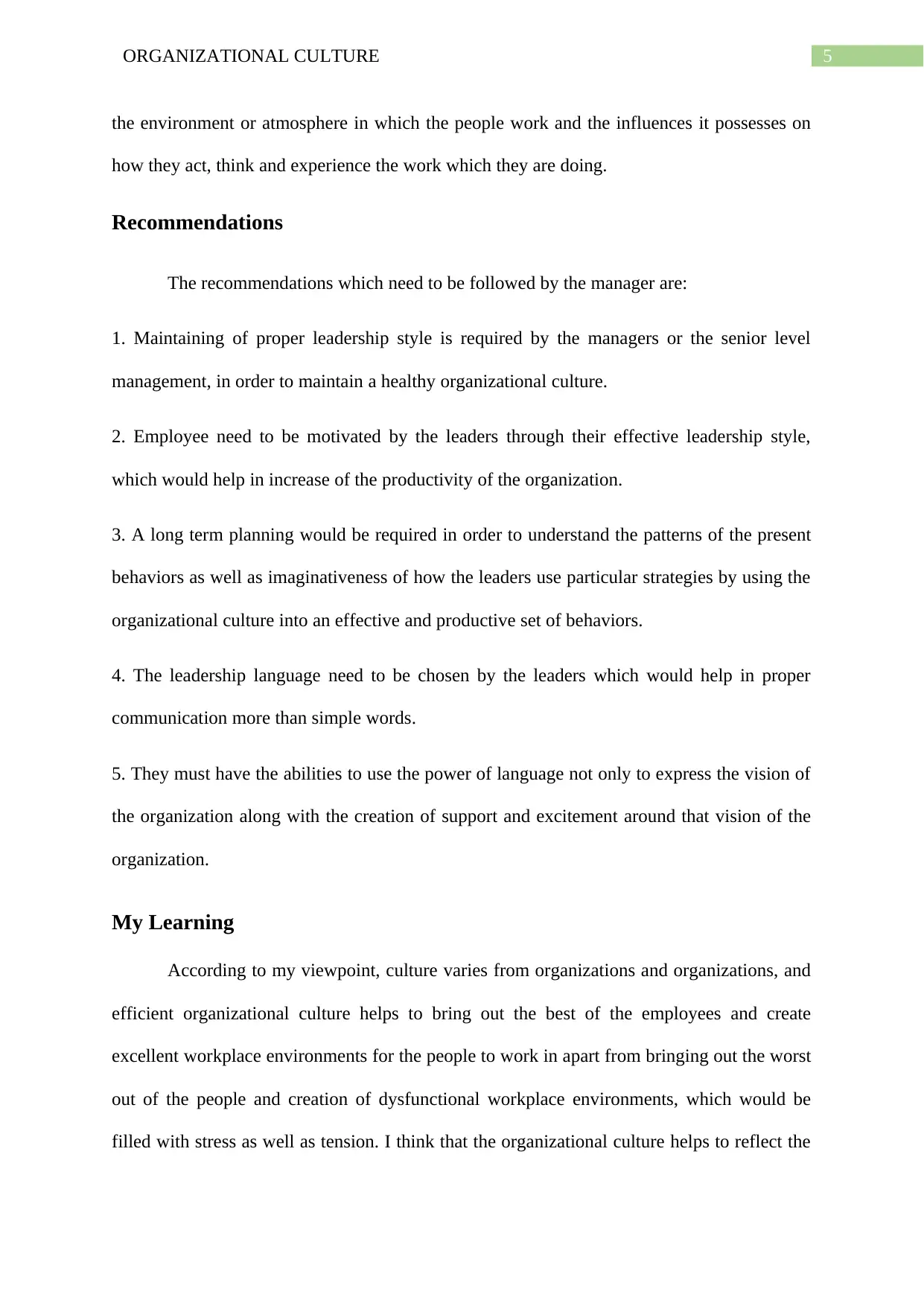
5ORGANIZATIONAL CULTURE
the environment or atmosphere in which the people work and the influences it possesses on
how they act, think and experience the work which they are doing.
Recommendations
The recommendations which need to be followed by the manager are:
1. Maintaining of proper leadership style is required by the managers or the senior level
management, in order to maintain a healthy organizational culture.
2. Employee need to be motivated by the leaders through their effective leadership style,
which would help in increase of the productivity of the organization.
3. A long term planning would be required in order to understand the patterns of the present
behaviors as well as imaginativeness of how the leaders use particular strategies by using the
organizational culture into an effective and productive set of behaviors.
4. The leadership language need to be chosen by the leaders which would help in proper
communication more than simple words.
5. They must have the abilities to use the power of language not only to express the vision of
the organization along with the creation of support and excitement around that vision of the
organization.
My Learning
According to my viewpoint, culture varies from organizations and organizations, and
efficient organizational culture helps to bring out the best of the employees and create
excellent workplace environments for the people to work in apart from bringing out the worst
out of the people and creation of dysfunctional workplace environments, which would be
filled with stress as well as tension. I think that the organizational culture helps to reflect the
the environment or atmosphere in which the people work and the influences it possesses on
how they act, think and experience the work which they are doing.
Recommendations
The recommendations which need to be followed by the manager are:
1. Maintaining of proper leadership style is required by the managers or the senior level
management, in order to maintain a healthy organizational culture.
2. Employee need to be motivated by the leaders through their effective leadership style,
which would help in increase of the productivity of the organization.
3. A long term planning would be required in order to understand the patterns of the present
behaviors as well as imaginativeness of how the leaders use particular strategies by using the
organizational culture into an effective and productive set of behaviors.
4. The leadership language need to be chosen by the leaders which would help in proper
communication more than simple words.
5. They must have the abilities to use the power of language not only to express the vision of
the organization along with the creation of support and excitement around that vision of the
organization.
My Learning
According to my viewpoint, culture varies from organizations and organizations, and
efficient organizational culture helps to bring out the best of the employees and create
excellent workplace environments for the people to work in apart from bringing out the worst
out of the people and creation of dysfunctional workplace environments, which would be
filled with stress as well as tension. I think that the organizational culture helps to reflect the
⊘ This is a preview!⊘
Do you want full access?
Subscribe today to unlock all pages.

Trusted by 1+ million students worldwide
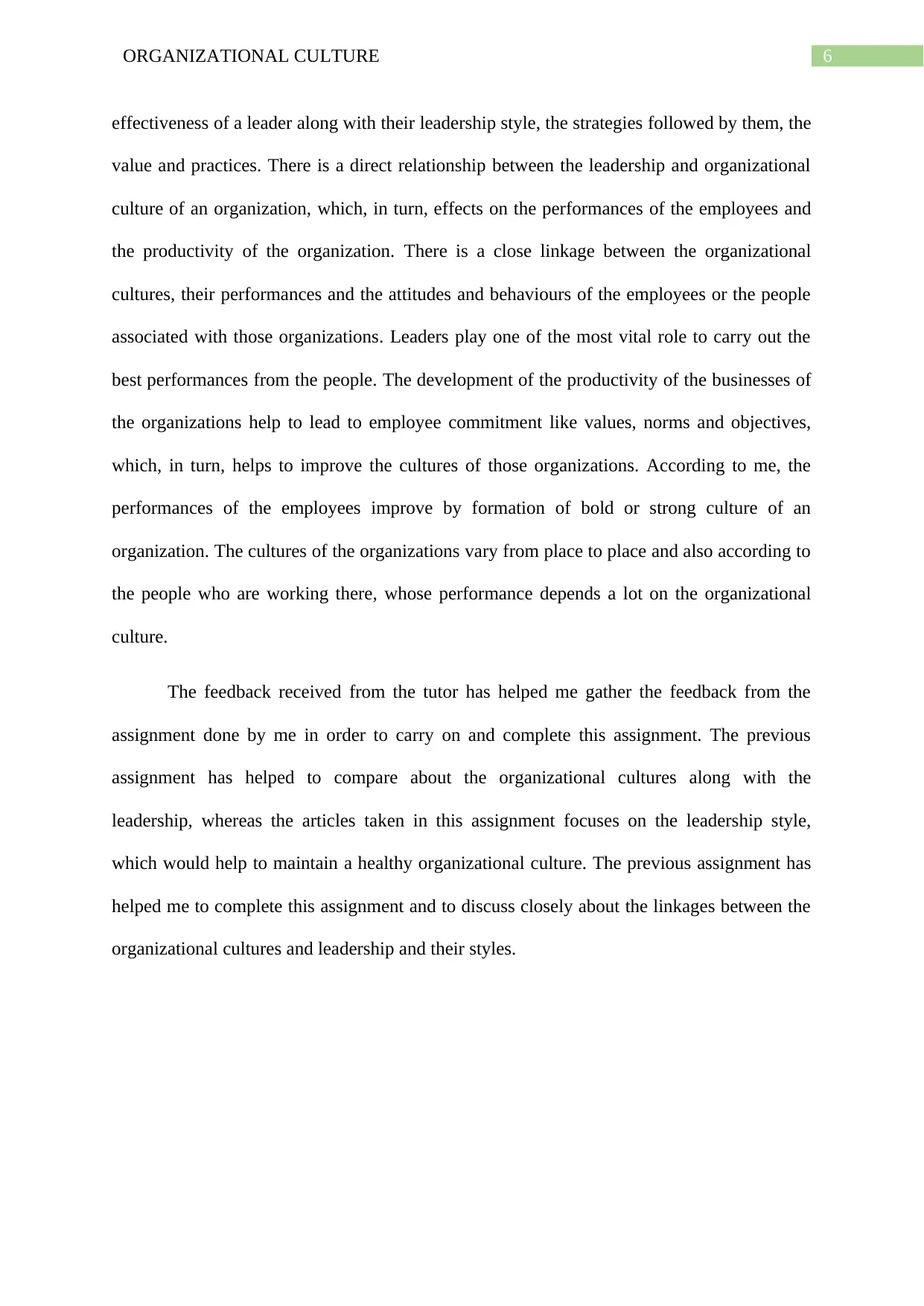
6ORGANIZATIONAL CULTURE
effectiveness of a leader along with their leadership style, the strategies followed by them, the
value and practices. There is a direct relationship between the leadership and organizational
culture of an organization, which, in turn, effects on the performances of the employees and
the productivity of the organization. There is a close linkage between the organizational
cultures, their performances and the attitudes and behaviours of the employees or the people
associated with those organizations. Leaders play one of the most vital role to carry out the
best performances from the people. The development of the productivity of the businesses of
the organizations help to lead to employee commitment like values, norms and objectives,
which, in turn, helps to improve the cultures of those organizations. According to me, the
performances of the employees improve by formation of bold or strong culture of an
organization. The cultures of the organizations vary from place to place and also according to
the people who are working there, whose performance depends a lot on the organizational
culture.
The feedback received from the tutor has helped me gather the feedback from the
assignment done by me in order to carry on and complete this assignment. The previous
assignment has helped to compare about the organizational cultures along with the
leadership, whereas the articles taken in this assignment focuses on the leadership style,
which would help to maintain a healthy organizational culture. The previous assignment has
helped me to complete this assignment and to discuss closely about the linkages between the
organizational cultures and leadership and their styles.
effectiveness of a leader along with their leadership style, the strategies followed by them, the
value and practices. There is a direct relationship between the leadership and organizational
culture of an organization, which, in turn, effects on the performances of the employees and
the productivity of the organization. There is a close linkage between the organizational
cultures, their performances and the attitudes and behaviours of the employees or the people
associated with those organizations. Leaders play one of the most vital role to carry out the
best performances from the people. The development of the productivity of the businesses of
the organizations help to lead to employee commitment like values, norms and objectives,
which, in turn, helps to improve the cultures of those organizations. According to me, the
performances of the employees improve by formation of bold or strong culture of an
organization. The cultures of the organizations vary from place to place and also according to
the people who are working there, whose performance depends a lot on the organizational
culture.
The feedback received from the tutor has helped me gather the feedback from the
assignment done by me in order to carry on and complete this assignment. The previous
assignment has helped to compare about the organizational cultures along with the
leadership, whereas the articles taken in this assignment focuses on the leadership style,
which would help to maintain a healthy organizational culture. The previous assignment has
helped me to complete this assignment and to discuss closely about the linkages between the
organizational cultures and leadership and their styles.
Paraphrase This Document
Need a fresh take? Get an instant paraphrase of this document with our AI Paraphraser
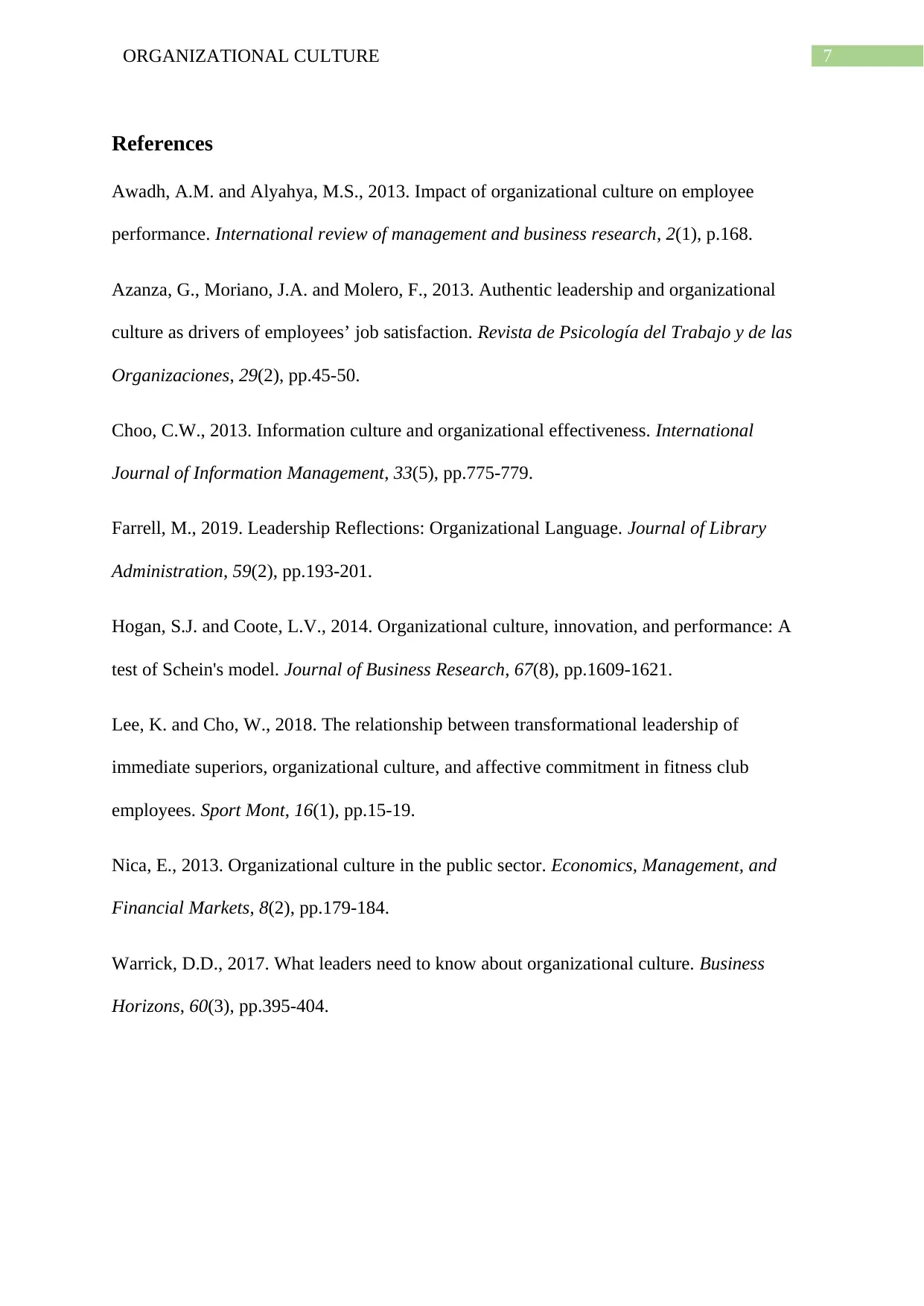
7ORGANIZATIONAL CULTURE
References
Awadh, A.M. and Alyahya, M.S., 2013. Impact of organizational culture on employee
performance. International review of management and business research, 2(1), p.168.
Azanza, G., Moriano, J.A. and Molero, F., 2013. Authentic leadership and organizational
culture as drivers of employees’ job satisfaction. Revista de Psicología del Trabajo y de las
Organizaciones, 29(2), pp.45-50.
Choo, C.W., 2013. Information culture and organizational effectiveness. International
Journal of Information Management, 33(5), pp.775-779.
Farrell, M., 2019. Leadership Reflections: Organizational Language. Journal of Library
Administration, 59(2), pp.193-201.
Hogan, S.J. and Coote, L.V., 2014. Organizational culture, innovation, and performance: A
test of Schein's model. Journal of Business Research, 67(8), pp.1609-1621.
Lee, K. and Cho, W., 2018. The relationship between transformational leadership of
immediate superiors, organizational culture, and affective commitment in fitness club
employees. Sport Mont, 16(1), pp.15-19.
Nica, E., 2013. Organizational culture in the public sector. Economics, Management, and
Financial Markets, 8(2), pp.179-184.
Warrick, D.D., 2017. What leaders need to know about organizational culture. Business
Horizons, 60(3), pp.395-404.
References
Awadh, A.M. and Alyahya, M.S., 2013. Impact of organizational culture on employee
performance. International review of management and business research, 2(1), p.168.
Azanza, G., Moriano, J.A. and Molero, F., 2013. Authentic leadership and organizational
culture as drivers of employees’ job satisfaction. Revista de Psicología del Trabajo y de las
Organizaciones, 29(2), pp.45-50.
Choo, C.W., 2013. Information culture and organizational effectiveness. International
Journal of Information Management, 33(5), pp.775-779.
Farrell, M., 2019. Leadership Reflections: Organizational Language. Journal of Library
Administration, 59(2), pp.193-201.
Hogan, S.J. and Coote, L.V., 2014. Organizational culture, innovation, and performance: A
test of Schein's model. Journal of Business Research, 67(8), pp.1609-1621.
Lee, K. and Cho, W., 2018. The relationship between transformational leadership of
immediate superiors, organizational culture, and affective commitment in fitness club
employees. Sport Mont, 16(1), pp.15-19.
Nica, E., 2013. Organizational culture in the public sector. Economics, Management, and
Financial Markets, 8(2), pp.179-184.
Warrick, D.D., 2017. What leaders need to know about organizational culture. Business
Horizons, 60(3), pp.395-404.
1 out of 8
Related Documents
Your All-in-One AI-Powered Toolkit for Academic Success.
+13062052269
info@desklib.com
Available 24*7 on WhatsApp / Email
![[object Object]](/_next/static/media/star-bottom.7253800d.svg)
Unlock your academic potential
Copyright © 2020–2026 A2Z Services. All Rights Reserved. Developed and managed by ZUCOL.





